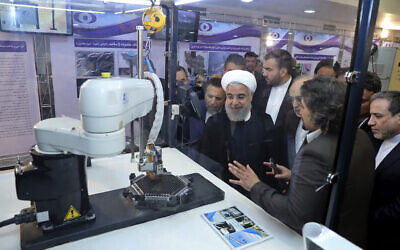Defense Minister Benny Gantz on Tuesday urged greater international efforts to counter Iran, after the Islamic Republic ramped up uranium enrichment to levels that breach curbs on its nuclear program.
“We know that Iran is continuing to ignite the region with instability and chose to raise enrichment to 20 percent. Iran is a global and regional challenge and we too have our eyes open,” Gantz said in a video statement.
He added: “Everyone needs to join together in the fight against Iran, its regional terror activities and the threat of its nuclear armament.”
Gantz spoke as he toured the training base of the navy’s elite Shayetet 13 commando unit in northern Israel.
“Today I’m visiting the navy and its elite units… which operate in every space, close or far, above the water or below it,” he said, praising the “great work” of the soldiers.

Centrifuge machines in the Natanz uranium enrichment facility in central Iran, November 5, 2019. (Atomic Energy Organization of Iran via AP, File)
Gantz issued a similar appeal on Monday, vowing that Israel would prevent Iran from obtaining nuclear weapons.
“The entire world must step up its pressure, and we must ensure that the defense establishment has the resources needed so that we can be prepared to deal with Iran as necessary on all fronts. We are working with many partners on all fronts and we must continue this trend,” he said.
Prime Minister Benjamin Netanyahu likewise said Israel wouldn’t allow Iran to develop nuclear arms and said its decision to increase uranium enrichment to 20 percent proves Tehran is seeking an atomic bomb.
Earlier Tuesday, Iran confirmed it was enriching uranium to 20% at the underground Fordo facility, well beyond the threshold set by its 2015 nuclear deal with major powers.
The UN’s International Atomic Energy Agency (IAEA) verified the move.

A satellite image from September 15, 2017, of the Fordo nuclear facility in Iran. (Google Earth)
It was the most striking violation yet of Iranian commitments under the landmark deal, a process it started in 2019 in response to US President Donald Trump’s dramatic withdrawal from the accord the previous year.
Announcing the move on Monday, government spokesman Ali Rabiei said President Hassan Rouhani had ordered the enrichment “in recent days” in line with a law passed last month by the conservative-dominated parliament.
Foreign Minister Mohammad Javad Zarif tweeted that “we resumed 20% enrichment as legislated by our parliament,” adding that the IAEA had been “duly notified.”
He stressed that Tehran took the step “after years of non-compliance” by other parties and that “our measures are fully reversible upon FULL compliance by ALL.”
The step comes less than three weeks before the end of the presidency of Trump, who has sought to economically punish and diplomatically isolate Iran with a “maximum pressure” campaign, including tough sanctions.

In this April 9, 2018 file photo, released by an official website of the office of the Iranian Presidency, President Hassan Rouhani listens to explanations on new nuclear achievements at a ceremony to mark “National Nuclear Day,” in Tehran, Iran.(Iranian Presidency Office via AP, File)
The outgoing US administration deplored Iran’s plan to step up uranium enrichment, while the European Union said it marked a “considerable departure” from the deal.
Uranium enriched to 20% is far below the 90% needed to construct nuclear bombs, but the jump from 20% to 90% is rather quick compared to the work needed to move from 4% to 20%.
Since the assassination in late November of Iranian nuclear physicist Mohsen Fakhrizadeh, which Iran has blamed on Israel, hardliners in Tehran pledged a response and parliament passed a controversial law calling for the production and storage of “at least 120 kilograms per year of 20% enriched uranium” and to “put an end” to the IAEA inspections intended to check that the country is not developing an atomic bomb.
The Iranian government opposed the initiative, which was also condemned by the other signatories to the accord who called on Tehran not to “compromise the future.”
Quoted by the government’s website, Iranian government spokesman Rabiei said that the administration’s stance toward the law is clear, “but the government considers itself bound to carry out the law.”
Agencies contributed to this report.
 RSS Feed
RSS Feed















 January 5th, 2021
January 5th, 2021  Awake Goy
Awake Goy  Posted in
Posted in  Tags:
Tags: 













